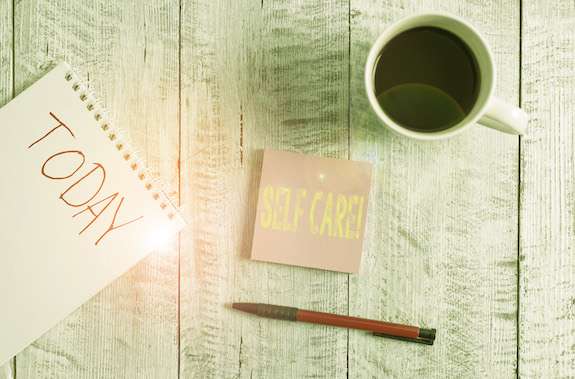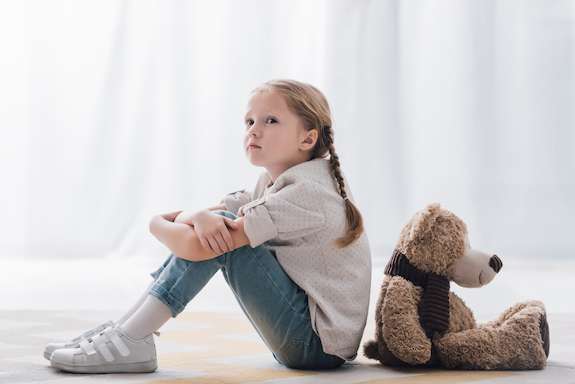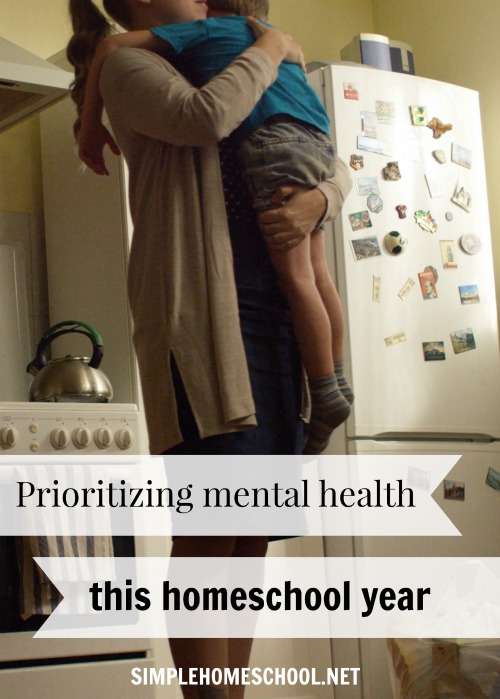Prioritizing mental health in your homeschool this year ~
Written by Kara Anderson, author of More Than Enough
It feels more important than ever to prioritize mental health in our homeschools.
Little quirks we’ve noticed—a child who has trouble falling asleep or feels a bit anxious—can grow if left unchecked. And truthfully, we all have moments where our own stress or worries feel a little bigger than before.
As we step into this new homeschool year, it’s worth remembering that lessons and schedules matter, but so does the emotional well-being of every person in our home.
When we care for our children’s mental health—and our own—we create a learning environment where everyone can truly thrive.
Prioritizing Mental Health in Your Homeschool This Year
Self-care matters (and isn’t selfish!)
My main mental health struggle is anxiety. Looking back now, I can see that I’ve had it since I was a kid. Luckily, I have a counselor and a doctor who I work with to balance my medication and keep me on track with self-care.
In fact, at every appointment, both my doctor and my counselor ask me what I am doing for self-care.
Much more than a trendy term that translates to manicures and face masks, self-care can encompass many physical, emotional and spiritual components to help us stay at our best.
Things like:
- Exercise or movement
- Journaling
- Prayer or meditation
- Eating well
- Staying hydrated
- Making time for hobbies and interests
If you or your kiddos are highly sensitive, it’s helpful to take sensory needs into account, too – it might help to burn candles to eliminate stale smells or try to limit noise as much as possible.
A daily walk might help you reset when recovering from a melt-down (yours or theirs.)
Mostly, self-care is about figuring what you need, and knowing that it’s okay to need it.
And by prioritizing it, we’re teaching our kids that it’s okay to care for ourselves and good to learn healthy coping mechanisms.

Plan for it
Something I’ve learned is that when things reach an emotional boiling point, it feels so much better to take an intentional mental health day (or even half-day), than it does to lose your cool and throw in the towel on a random Wednesday.
So when things start to get hard, it can be really helpful to just notice…
Signs to look for in our kids can include crying more often, “whining,” arguing with siblings – these things can feel frustrating and feed into our own anxiety, worry and insecurity. But if we can pull back and see the bigger picture, these behaviors are just the tip of the iceberg.
In my book, More Than Enough, I share about how what we see of an iceberg is just the top percent. The remaining 90 percent is invisible beneath the water:
“That’s how I think of behavior.
Throwing the pencil out of frustration is the part we see.
What we don’t see is fear:
- I don’t understand long division
- My brother gets long division and he’s two years younger than me
- What if I never get this?
- Am I stupid?
- Does Mom think I’m stupid?
Imagine all those thoughts swirling in you. I would want to throw a pencil too.
I’m not condoning the throwing of sharp implements, of course, I’m just saying that when our kids are struggling, it’s so important not to pile on, and to address the underlying cause, not just the outward behavior.”
And the underlying cause might very well be stress and overwhelm.
Our kids may not be able to vocalize it, but many of them feel it.
And parents do too.
So what can you do when it all feels like too much?
First, you can remember that you are not alone in this.
Second, when your kids are having a hard time emotionally, take off your teacher hat, throw it across the room, and focus on your baby, even if that baby is 16 and taller than you are.
Emotional needs are REAL, which is why you must also focus on your own self-care as a parent.
You can’t help anyone if you are just barely holding on yourself.
So my advice this year is to focus on prioritizing mental health in your homeschool.
In ten years’ time, you’ll look back and know that you made the right decision – one that just might have made all the difference for you and your people.
* Click here to read more of Kara’s inspirational writing on SH.
(And if that means you need extra help, don’t be afraid to reach out to your doctor or a counselor. Or, you can also contact the National Alliance on Mental Illness Helpline at 800-950-6264 Monday through Friday from 10 a.m, to 6 p.m., EST or in a crisis, text “NAMI” to 741741 for 24/7, confidential, free crisis counseling.)
What’s Your Homeschool Mom Personality? Take Jamie’s quiz now and receive a free personality report to help you organize your homeschool based on what your personality type needs most!




 Read your way to a love of math: 75+ titles for ages 4-12 (UPDATED!)
Read your way to a love of math: 75+ titles for ages 4-12 (UPDATED!)
This is so good, Kara – and so needed right now. Thank you.
Shawna Wingert’s latest post: What You Need To Know About Your First Month Back To School (even at home)
Aww. Thank you, friend.
I am a single mom with two children on the opposite end of the learning spectrum. One loves school and thrives with online stuff the other needs the one on one instruction. With juggling a demanding full time job it will be challenging, but we will make it work. Thank you for these reminders, it helps!
Thank you for acknowledging my family’s reality. While working in a school this spring, I saw that education wasn’t really happening, and my child has special needs and can’t afford to get further behind. But more to the point, my child had a mental health emergency this summer brought on by the isolation caused by this pandemic and my high-risk status (yet another reason for us to stay out of the schools). Suddenly, we are dealing with the behavioral health system at the same time as homeschooling for the first time. I’ve been reading lots of blog posts that I just don’t relate to, about things like worrying about being a perfect instructor or the best homeschool family or making the prettiest homeschool room etc., whereas I am dealing with a tween continually teetering on the edge of a meltdown who is plastered to my side needing reassurance and continual encouragement. Surely we are not alone!